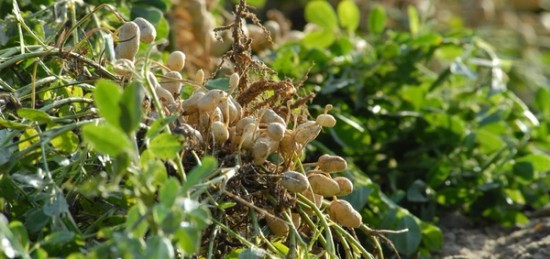Bacteria are everywhere; teeming all over your skin, toothbrush, and even in your gut. While that thought might make you cringe, holster that antibacterial gel because not all of these microorganisms are as icky as you might suspect. In fact, we co-exist and even have a symbiotic relationship with many bacteria. The same is true for other living organisms, including peanuts. And it is because of a certain type of bacteria that peanuts are able to convert, or “fix” their own nitrogen, which helps make them a naturally sustainable crop.
There are many factors that contribute to peanuts’ relatively small environmental footprint. Their water consumption is minimized by their short plant size, as well as their ability to root deep underground. And research by America’s peanut farmers and industry have led to more efficient peanut breeds that have higher yields without requiring more water.
But another sustainable aspect of peanuts is their natural ability to fix nitrogen from the air and soil, thereby reducing the need for fertilizer for production. To break it all down and help it make sense, let’s look at the science behind this process.
First, it’s important to note that nitrogen exists in the form of a gas (N2) all around us. It makes up approximately 80% of the atmosphere, and is one of the life-sustaining elements that all organisms use. That said, N2 in its inert state is unusable by most living organisms, and must be converted to ammonia (NH3) in order to be biologically viable.
Enter bacteria.
The conversion of N2 to NH3 is made possible in nature thanks to bacteria. This conversion process, known as nitrogen-fixing, occurs regularly in the environment and benefits plants in natural ecosystems. (Check out this lesson plan from American Farm Bureau on the Nitrogen Cycle).
Because plants use nitrogen from the soil, farming crops can often deplete the available fixed nitrogen in the soil faster than it can be regenerated. That’s why farmers apply nitrogen-rich fertilizers to the field to replenish the land and “feed” the plants.
However, some plant species, including legumes, are able to generate their own nitrogen-fixing because they host bacteria in their roots. Peanuts are a legume with amazing nitrogen-fixing properties.
According to New Mexico State University Peanut Breeder, Naveen Puppala, “peanuts have these bacteria called Bradyrhizobium which are specific to the legume. There has to be a native bacteria present in the soil and that has to come into contact with the root of the peanut plant to form a nodule on the roots. And once the nodules are formed [the bacteria] takes the atmospheric nitrogen from the air and fixes the nitrogen from the air to the plant, from the plant to the soil.”

Late-season nitrogen-fixing Bradyrhizobium nodules on peanut roots. (Image courtesy of Calvin Trostle, Ph.D., Texas A&M AgriLife).

Mid-season nitrogen-fixing Bradyrhizobium nodule development on the lower peanut root. The top plant was not inoculated. (Image courtesy of Calvin Trostle, Ph.D., Texas A&M AgriLife).
The rhizobium bacteria, or more specifically Bradyrhizobium, that develop in nodules on the peanut plant’s roots live off of the plant itself. They also give back to the plant by producing enough nitrogen to meet all of the plant’s needs. And because peanuts can sustain their own nitrogen needs, that means there is an added benefit to the environment.
“The biggest advantage is we don’t need to apply that much fertilizer,” said Puppala. He notes that since peanuts have the inherent ability to fix nitrogen instead of absorbing it from the soil, that means farmers don’t have to continuously apply fertilizer to the crop. And less input into the field saves on everything from water and energy to financial costs.
Peanut hay, or the plant material left behind after the peanut pods are harvested, also has residual nitrogen in the vines and leaves that can be tilled back into the soil to decompose and naturally fertilize the field for the next crop to be planted. All of these attributes make peanuts an excellent crop to plant in rotation with other crops.
So bacteria aren’t all bad. There are beneficial bacteria that play a role in sustaining life and the environment. And we can thank the nitrogen-fixing bacteria in peanut plants for adding to the sustainability of America’s favorite nut.
